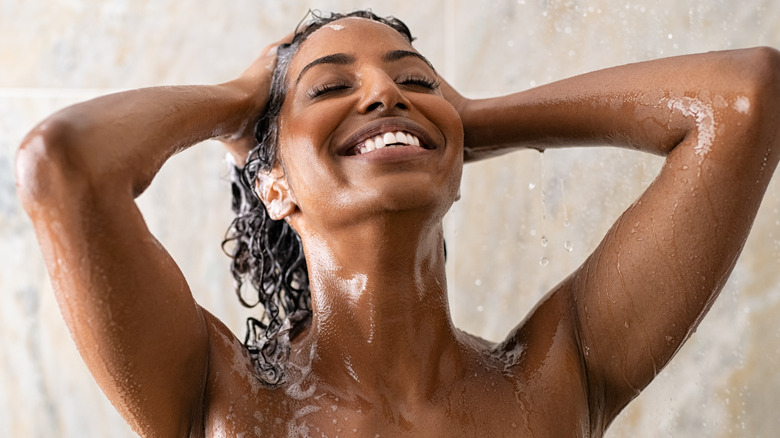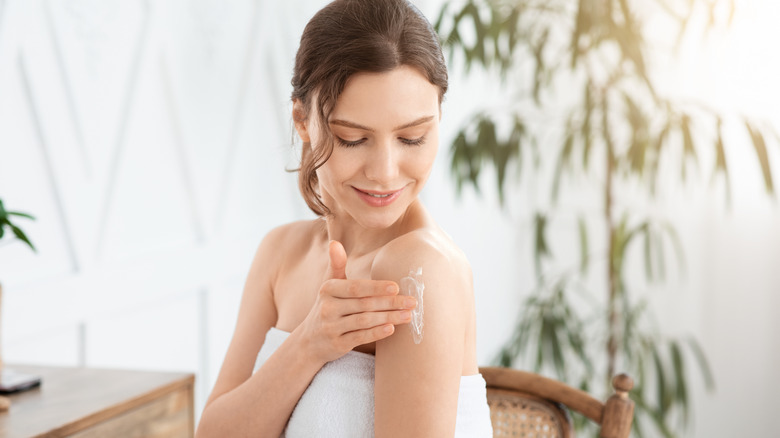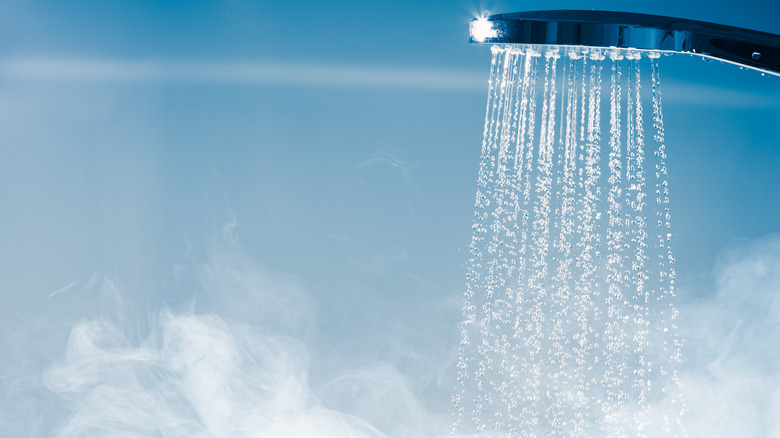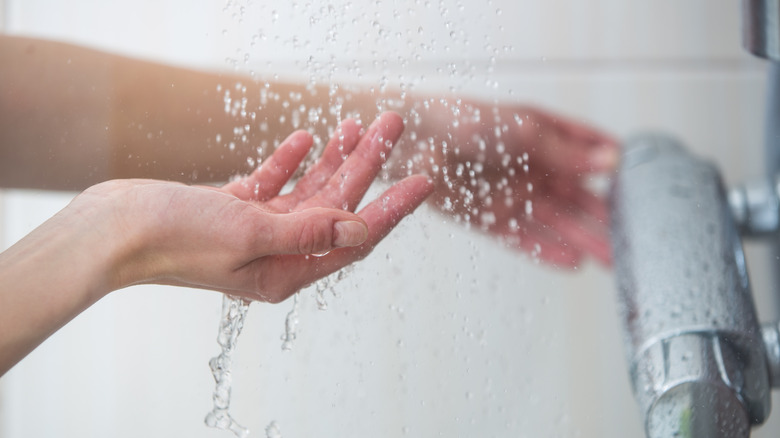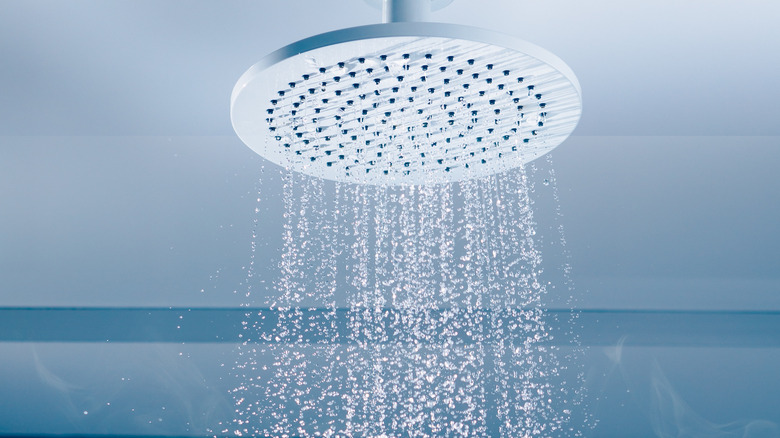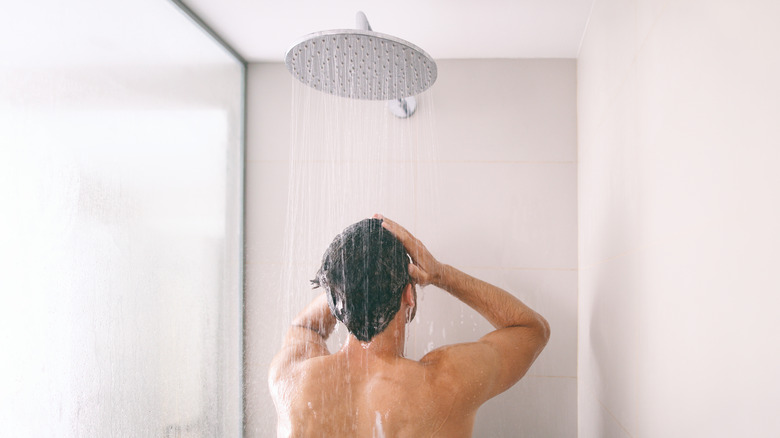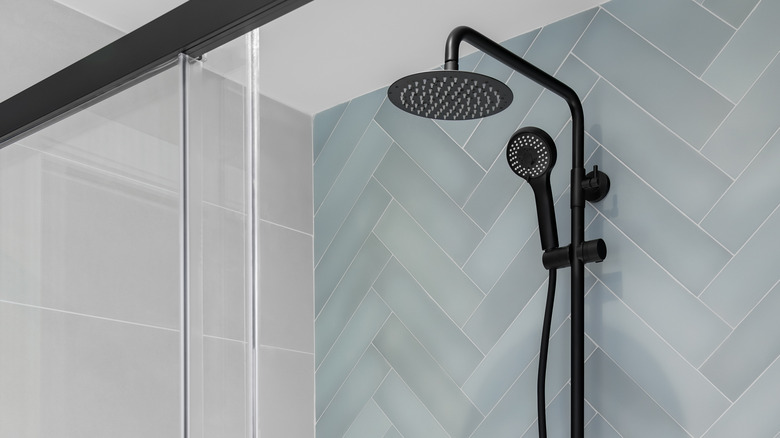Why Your Shower May Actually Be Drying Out Your Skin
A shower can be extremely relaxing and refreshing, which is why we're often tempted to stand under the water for an extended period of time just soaking in the hot, steamy spray. There's no doubt about it, showers can be extremely relaxing and enjoyable, but have you ever thought about how your shower routine impacts your skin? In the great debate between bath vs. shower, one may actually be better for you than the other.
As per Very Well Health, showers can have a significant impact on skin health, and showering too frequently or using water that's too hot can cause a range of problematic skin issues. MindBodyGreen explains that one key factor when it comes to your showering habits and the impact on skin health is whether you have soft or hard water. In addition to this, there are various factors related to showering that can surprisingly impact the overall health of your skin.
Whether you've noticed your skin feeling drier than usual or you're experiencing another strange side effect when you exit the shower, there may be an explanation for the issues you're encountering.
How do showers impact skin health?
Apparently, there's a right way to take a shower and a wrong way, and one of the factors playing into this is the type of water you're using. According to MindBodyGreen, the type of water you're showing in and whether it's hard or soft water can impact your skin. For some people, this can affect overall skin health and cause issues such as dry skin, soreness, and skin that feels rough to the touch.
But how do you determine what your home's water supply is made up of to find out whether you have hard water or soft water? And how do you know which water type has the biggest impact on your skin?
Can other factors (besides water type) affect skin health?
HuffPost reports that a variety of factors, including hard water, can impact skin health after you shower. These factors include using water that's too hot and using soap that overly lathers when you're bathing. Both of these can strip your skin of its natural oils and leave the epidermis feeling drier and rougher over time. This means that it's not just the showering process that can affect your skin, although hard water can have a rather detrimental effect. It's important to also be mindful of other contributing factors, such as the products you use while you're bathing.
Why is hard water problematic for skin?
Hard water typically causes more issues than soft water due to the number of minerals that make up hard water, including calcium and magnesium. These minerals can cause skin damage because they have the ability to change the pH balance of your skin, which can have an effect on the microbiome. According to the National Institute of Environmental Health Sciences, "The microbiome is the collection of all microbes, such as bacteria, fungi, viruses, and their genes, that naturally live on our bodies and inside us."
Want to determine whether your water is hard or soft? MindBodyGreen has a super handy hack for finding out. Add tap water to a bottle (filling it one-third of the way up), add a squirt of liquid soap, and shake. If the water turns cloudy and has little foam, then you have hard water.
How can you protect skin from shower-related damage?
If you've discovered that you do, in fact, have hard water in your shower, the good news is that you can take preventative steps to protect your skin from water-related damage. VeryWellHealth advises moisturizing immediately after showering with a fragrance-free product to seal in hydration. On the other hand, MindBodyGreen states that for best results, it's advisable to opt for products featuring occlusives, emollients, and humectants, as these bring moisture into the skin. These products also soften rough patches and ensure that hydration remains trapped inside the epidermis.
Using an oat-based body wash and moisturizer when showering in hard water is another great tip according to MindBodyGreen, as it can soothe irritated skin and protect the delicate skin barrier.
Should you cut back on the number of showers you take?
If you're worried about your skin even after taking these preventative measures, it's worth cutting back the number of showers you take to protect your skin even further. Ideally, you should only shower once per day. The less your skin is exposed to hard water (and the minerals it includes), the fewer problems that will occur. It's also worth noting that because the heat of the shower and the products you use contribute to skin issues, cutting back on the number of showers you take maybe the most beneficial step overall.
Can a water softener help?
A handy hack from MindBodyGreen for those who don't want to shower less often is to add a water softener to your tap or buy a water softening shower head. These tools can block harsh minerals from passing into the water, protecting your skin and making your water softer at the same time.
VeryWellHealth states that to ward off shower-related skin issues, it's a good idea to keep your body hydrated throughout the day by drinking plenty of water, as this helps prevent the skin from drying out. It's best to avoid skincare products that sting, burn, or cause itching or discomfort as well.
